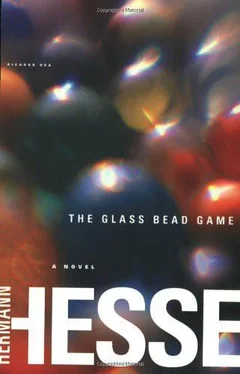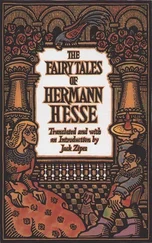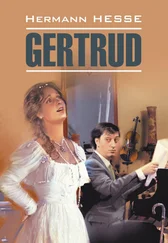It seemed to him that a long time had passed before he glided out of that space once more, again became aware of the chair he sat on, the mat-covered stone floor, the dimmer dusk outside the windows. He felt someone regarding him, looked up and into the eyes of the Music Master, who was attentively studying him. The Master gave him an almost imperceptible nod, with one finger played pianissimo the last variation of the Italian piece, and stood up.
“Stay on,” he said. “I shall be back. Try once again to track down the music; pay attention to the figure. But don’t force yourself; it’s only a game. If you should fall asleep over it, there’s no harm.”
He left; there was still a task awaiting him, left over from the overcrowded day. It was no easy and pleasant task, none that he would have wished for. One of the students in the conducting course was a gifted but vain and overbearing person. The Music Master would have to speak to him now, curbing his bad habits, showing him his faults, all this with an even balance of solicitude and superiority, love and authority. He sighed. What a pity that no arrangements were ever final, that recognized errors were never eliminated for good, that again and again the selfsame failings had to be combated, the selfsame weeds plucked out. Talent without character, virtuosity without values, had dominated musical life in the Age of the Feuilleton, had been extirpated during the musical Renaissance — and here was that same spirit again, making vigorous growth.
When he returned from his errand to have supper with Joseph, he found the boy sitting still, but contented and no longer tired in the least. “It was beautiful,” Joseph said dreamily. “While it was going on, the music vanished completely; it changed.”
“Let it reverberate inside you,” the Master said, leading him into a small chamber where a table was set with bread and fruit. They ate, and the Master invited him to sit in on the conducting course for a while in the morning. Just before showing his guest to his cell and retiring for the night, he said: “During your meditation you saw something; the music appeared to you as a figure. If you feel so minded, try to copy it down.”
In the guest cell Knecht found pencils and paper on the table, and before he went to bed he tried to draw the figure which the music had assumed for him. He drew a line, and moving diagonally off from the line at rhythmic intervals short tributary lines. It looked something like the arrangement of leaves on the twig of a tree. What he had produced did not satisfy him, but he felt impelled to try it again and yet again. At last he playfully curved the line into a circle from which the tributary lines radiated, like flowers in a garland. Then he went to bed and fell asleep quickly. He dreamed that he was once again on that height above the woods, where he had rested with his classmate, and saw dear Eschholz spread out below him. And as he looked down, the quadrangle of the school building contracted into an oval and then spread out to a circle, a garland, and the garland began turning slowly; it turned with increasing speed, until at last it was whirling madly and burst, flying apart into twinkling stars.
He had forgotten this dream by the time he awoke. But later, during a morning walk, the Master asked him whether he had dreamt, and it seemed to him that he must have had an unpleasant experience in his dreams. He thought, recovered the dream, told it, and was astonished at how innocuous it sounded. The Master listened closely.
“Should we be mindful of dreams?” Joseph asked. “Can we interpret them?”
The Master looked into his eyes and said tersely: “We should be mindful of everything, for we can interpret everything.”
After they had walked on a bit, he asked paternally: “Which school would you most like to enter?”
Joseph flushed. He murmured quickly: “Waldzell, I think!”
The Master nodded. “I thought so. Of course you know the old saying: ‘ Gignit autem artificiosam ’…”
Still blushing, Joseph completed the saying familiar to every student: “ Gignit autem artificiosam lusorum gentem Cella Silvestris ”: “But Waldzell breeds the skillful Glass Bead Game players.”
The old man gave him a warm look. “Probably that is your path, Joseph. As you well know, there are some who do not think well of the Glass Bead Game. They say it is a substitute for the arts, and that the players are mere popularizers; that they can no longer be regarded as truly devoted to the things of the mind, but are merely artistic dilettantes given to improvisation and feckless fancy. You will see how much or how little truth there is in that. Perhaps you yourself have notions about the Glass Bead Game, expecting more of it than it will give you, or perhaps the reverse. There is no doubt that the Game has its dangers. For that very reason we love it; only the weak are sent out on paths without perils. But never forget what I have told you so often: our mission is to recognize contraries for what they are: first of all as contraries, but then as opposite poles of a unity. Such is the nature of the Glass Bead Game. The artistically inclined delight in the Game because it provides opportunities for improvisation and fantasy. The strict scholars and scientists despise it — and so do some musicians also — because, they say, it lacks that degree of strictness which their specialties can achieve. Well and good, you will encounter these antinomies, and in time you will discover that they are subjective, not objective — that, for example, a fancy-free artist avoids pure mathematics or logic not because he understands them and could say something about them if he wished, but because he instinctively inclines toward other things. Such instinctive and violent inclinations and disinclinations are signs by which you can recognize the pettier souls. In great souls and superior minds, these passions are not found. Each of us is merely one human being, merely an experiment, a way station. But each of us should be on the way toward perfection, should be striving to reach the center, not the periphery. Remember this: one can be a strict logician or grammarian, and at the same time full of imagination and music. One can be a musician or Glass Bead Game player and at the same time wholly devoted to rule and order. The kind of person we want to develop, the kind of person we aim to become, would at any time be able to exchange his discipline or art for any other. He would infuse the Glass Bead Game with crystalline logic, and grammar with creative imagination. That is how we ought to be. We should be so constituted that we can at any time be placed in a different position without offering resistance or losing our heads.”
“I think I understand,” Joseph said. “But are not those who have such strong preferences and aversions simply more passionate natures, others just more sober and temperate?”
“That seems to be true and yet it is not,” the Master replied, laughing. “To be capable of everything and do justice to everything, one certainly does not need less spiritual force and élan and warmth, but more. What you call passion is not spiritual force, but friction between the soul and the outside world. Where passion dominates, that does not signify the presence of greater desire and ambition, but rather the misdirection of these qualities toward an isolated and false goal, with a consequent tension and sultriness in the atmosphere. Those who direct the maximum force of their desires toward the center, toward true being, toward perfection, seem quieter than the passionate souls because the flame of their fervor cannot always be seen. In argument, for example, they will not shout and wave their arms. But I assure you, they are nevertheless burning with subdued fires.”
Читать дальше












